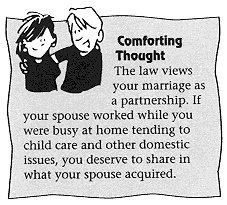|
|
|
|
|
|
|
Check with an attorney about this tricky area. Pensions are often divided 50-50 from the date of your marriage until the date you separated, started a divorce action, or actually became divorced. |
|
|
|
|
|
|
|
|
Taxes are a joint responsibility as well. It's fair for spouses to agree that if past filed joint tax returns are audited, and if there is a deficiency, the spouse whose income (or failure to report income or aggressive deduction) caused the trouble pays the tax debt. If it is impossible to figure out who's to blame, you should each pay half the debt. While the spouse who didn't work may be appalled at this idea, the truth is you both enjoyed the money when it was earned, and you were also responsible for paying Uncle Sam. |
|
|
|
|
|
|
|
|
Debt is a joint burden as well. Remember the game of hot potato? You might feel like you're playing it again when it comes to determining who walks away from the marriage with the debt. Many people think that just because their spouse paid the bills during the marriage, he or she will continue in that obligation after divorce. Nothing could be further from the truth. Judges will divide debt just as they divide assets. And although the lion's share of the debt may go to the spouse with the significantly larger income, an individual who has managed to avoid paying bills during marriage can be saddled with large loan payments after divorce, providing that individual has the income or assets to pay up. |
|
|
|
|
|
|
|
|
 |
|
|
|
|
|
|
|
|
Therefore, it's imperative that you subtract debt from savings before you divide stocks, bonds, or cash. If the debt is larger than the savings or you don't want to deplete savings, you still need to divide the debt. You can divide it any way that seems fair. If one of you overspent against the wishes of the other (maybe that's part of the reason you're divorcing), it might be fair for the spender to pay the debt, unless he or she spent the money for the family, in which case a 50-50 division of debt might be more fair. |
|
|
|
|
|
|
|
|
To protect your interests and arrive at a fair solution, make a list of your debt, when it was incurred, who incurred it, and why. Write down the monthly payment due, and then figure out who should and can pay it. If all else fails, ask for legal advice on this issue. It will cost you money, but it might save you money, too. |
|
|
|
|
|
|
|
|
Division of Property: Charting Your Possessions |
|
|
|
|
|
|
|
|
To help you implement the advice, above, we present our special Division of Property Chart. |
|
|
|
|
|